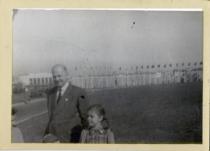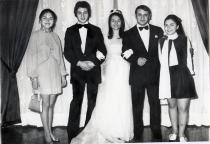I, Nesim Alkabes, was born on July 21st, 1920 in our brick home that was 30 m. further from Galata Kulesi [A neighborhood on the European side where Jews congregated in the beginning of the 20th century] with the help of a midwife. All my other siblings were born in this house like me. My father bought this house with his savings. We lived on one flat and rented out the other 3 flats. We lived there between 1920-1928. As far as I remember, it was not a big house. The entrance opened up to a hallway, at the end of it was the bedroom of my maternal grandmother, but it was such a small room that she did not have a bed, she would make one for herself every night on the floor. We had a closet we called "Yükli" in this room. We would put items such as mattresses, comforters in there. The system of sleeping on a floorbed worked for all of us, we all slept on the floor. We warmed the house with a coke-burning stove as well as a Belgian stove called "Salamandra" where you would feed it coals from the top and remove the ashes from the bottom. The maid lit these stoves. In the bathroom of this house, there was a shower boat, we didn't have a tub, once a month, in accordance with the rules of kashrut, we would go to a hamam in Kasimpsha together with all the ladies of the house (because I was still young). We would go there with a horse-carriage, this was a big event for us (paseo). The men would go to "Galatasaray Hamami" every Friday.
My first school was where Neve Shalom Synagogue is located now [A neighborhoodcalled Shishane that Jews preferred at the beginning of the century]. We had a synagogue called Knesset there, below the Synagogue we had our Jewish primary school. After I studied for 3 years in this school, I went to Saint Benoit for junior high and graduated. When I was only 8, my father provided me with 5 years of religious education in the form of two hours twice weekly from Rabbi Gabay who came to our house, just as his father had done for him. My father was very wealthy; we would pay the Rabbi 2 liras a day, sugar cost 28 kurus (the cost was decided by Atatürk ) then. "bu iki lira babama bir bardak su gibi gelirdi" "These two liras were like a glass of water for my father" [this is his saying]. As result when I celebrated my bar-mitzvah, my Hebrew and knowledge of the Torah was excellent. We celebrated my bar-mitzvah ceremony by inviting three priests from my school and our relatives to our house on a Sunday.
The home I remember most was in Beyoglu, the 4th story of "Meymenet Han" which was located on the corner of the hill where today stands Palais de France. [A neighborhood on the European side on a street called Rue de Péra where people would dress up to walk around or to shop]. On the ground floor of this apartment we had a store called "Bazar de Bébé" where they sold children's clothing. Because our apartment was located in a corner where the main street and the side street met, there was a lot of light and space. It was 200 square meters, and in the livingroom, out of 8 windows, 5 looked out on Istiklal Caddesi and 3 to the side street [today it is called Nuri Ziya Sokagi]. Next to the livingroom we had a room called"Fumoir" that was quite large. Whenever we had guests, my sisters' girl and boyfriends, my father's friends or our relatives, smoking was allowed only in this room; in addition we had a gramophone in this room and we would play waltzes, tangos etc. with stone discs that were produced by "Sahibinin Sesi" and that we had bought for 2 liras (we could buy 6 kg. of sugar with this money, a kg of sugar was 28 kurus, bread was 8 kurus). Other than our dance parties there were nights when we hosted dinner parties, other than the Sabbath or the holidays
Our home was one of the modern ones of the time, we had electricity and running water. Our house was heated by two Salamandra stoves located in the hallway and the livingroom (It was harder to keep warm than a coke-burning stove because it was much larger and we had to remove the ashes of the coal that was put from the top, from the drawer located in the bottom and add coal again before it went out) and a Chinese stove in the diningroom. The job of Fatma Hanim was really hard in winter, thanks to her, the rooms we lived in were always warm. Our bedrooms though were cold, on snowy days our father would put rugs on top of our comforters. We would heat water by burning logs on a stove-type apparatus. The stoves in the kitchen worked by gas piped into buildings. We have always had Muslim household help. Only, when I was 18, we had a 15 year old helper named Fortüne from Bursa. My first life experience was with this girl, when, 3 months later my mom became aware of the situation, it was the end of my first love affair. After that day we never had a nonMuslim helper.
I was called to military service between 1942 and 1945. I was a soldier in the 3rd regiment of the 2. Airforce battalion for 36 months, i.e. 3 years. In the first year of this period, we built the Malatya airport by mixing sand with cement and water. In the following 6 months, we dug gutters that were 2 m. deep in Adana airport to drain rainwater and filled them up with stones. The next 6 months I was a "writer" in the Çanakkale Bölügü(regiment). I would take roll call every morning and evening. I would look for runaways, I would grant doctor's visits to the sick ones. Here also they were building an airport, the soldiers were working under harsh conditions. These soldiers needed 2000 calories a day, I took care of the food supply. I spent the next year in Yakack Samandra [a neighborhood on the Asian side], and the last six months in Zonguldak Kokaksu as the writer of the regiment. There were quite a few Jewish youth from Izmir and Istanbul in this regiment. I met the friend next to me in the photograph here, his name was Negrin Rividin, we lost touch later on, where is he, what does he do, I have no idea.
I met my wife Erna Adoni, who was born on December 25th, 1924 and raised in Kadiköy, in 1947 at a party given by a mutual friend, and we liked each other. Because she is a graduate of St. Benoit like me, she speaks it as well as I do. When we decided to get married, Erna was 22, and I was 27. We went to ask for her hand from her father. I asked for a dowry of 25 thousand liras but he indicated he could not. He gave me a counter offer:
-"I will give you 10 thousand liras. You live with us for 2-3 years until you have enough savings (Meza franka, [Live-in son-in-law]) , you won't be responsible for any expenses, in this way you will save money".
I loved Erna so much that of course I accepted this offer. Other than my father-in-law, Erna also had an offer:
-"Look Nisim, I am a fan of Fenerbahçe, you are a fan of Galatasaray. If you do not become a fan of Fenerbahçe I will not marry you" ...[The most important two soccer teams in Turkey] I was obliged to accept and we had our civil ceremony on June 5th, 1947 in a place called 6.Daire [The office where weddings are officiated belonging to the municipality of Shishane, a neighborhood on the European side where Jews live]. Following that we married at the Zülfaris Synagogue on August 10th, 1947 [On the European side, in Karaköy, where the Jewish museum is located now]. After our wedding, we spent our honeymoon in Tarabya Hotel for 2 days [On the European side, overlooking the Bosphorus, one of the trendiest hotels of the time where all rooms overlooked the water, today unfortunately it has been transferred to the private sector and is in ruins] and Bursa Çelik Palas for 4 days. I was done with military service then and was working with my father.
Erna and I had three daughters from our union. Our oldest daughter Sara was born in 1948, Rosita in 1950, Stella in 1954. After completing their education, our oldest daughter Sara, married Erol Penso following 8 years of dating, on March 29th, 1970, in Neve Shalom. This photograph is of that day, after the synagogue, it was taken in Sara’s home where she lived for a long time.
They always lived on the European side, in a modern house. They raised two sons named Ceki (1972) and Niso(1974). Our daughter Sara always wished to study in college, while she was raising her family, (1997) she entered the university placement exam which is very hard and got accepted to the French Language and Literature faculty in ?stanbul Üniversitesi, graduated in 4 years. She has the right to translate and translates books and scientific articles. Their son Ceki has been married to a nice girl for two years, Niso on the other hand is engaged, G-d willing we will marry him in December. Currently we reside in the same apartment.
Our middle daughter Rosita married Jojo Balibarissever (September 30th 1973), a chemical engineer who graduated from the Bosphorus University, in Neve Shalom after finishing highschool.... My son-in-law worked for long years with Charles Danon who owns the Istanbul branch of Guido Modiano which is centered in Italy. In 1980, Mr. Guido offered my son-in-law a job in Italy since he was very happy with his work. In this way the family moved to Milan. Their two children Semi (1977) and Rifka (1976) are now grown up. Their son Semi works in a very important advertising company in Italy. Their daughter Rifka studied child psychology in a university in London. During that time she married Remi Menenson (Ashkenazi Jew, French origin) in 2004. They currently reside in London. Rifka works as a child psychologist in a Jewish school in London.
Our youngest daughter Stella graduated from the Bosphorus University with a degree in chemical engineering with outstanding achievement. With the help of the Israeli government she did her masters and doctorate in "The Weismann Institute of Science" in Rehovot for 8 years. After graduating she sent all her diplomas to New York and applied for a job. Of course she was accepted, she has been working as an academic for 20 years while continuing her research. She is now a United States citizen and is single. She comes every summer to Istanbul for 3 weeks to see us.































